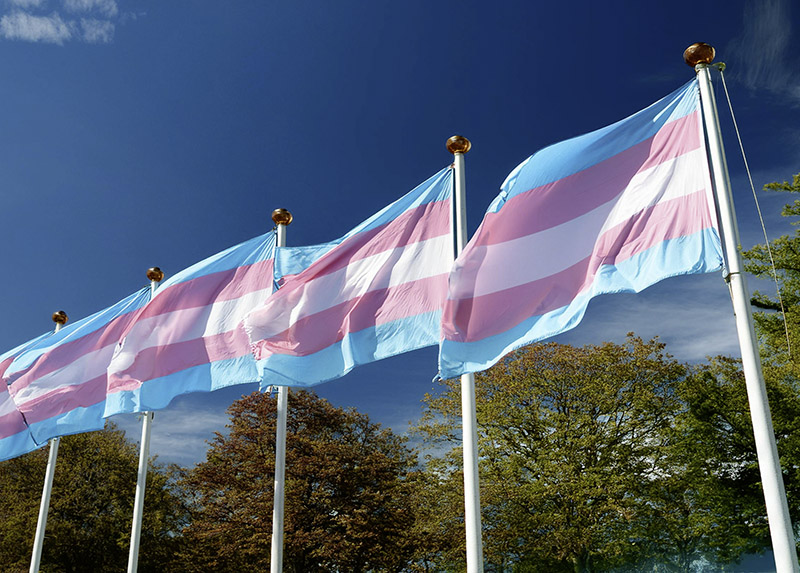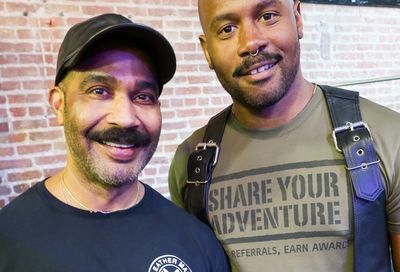Sarah McBride always knew she was different.
“I’ve known that I’m transgender as long as I can remember,” she says. Growing up as the youngest child with two older brothers in Wilmington, Del., McBride says it wasn’t until when she was about 8 years old that a poorly executed transgender storyline in a ’90s sitcom put a name on what made her so.

Photo by Julian Vankim
“I remember asking my mom what transgender meant,” McBride says. “And I remember asking her, ‘Is this possible that someone is born a boy and can change to be a woman?’ And I remember my mom saying yes, and explaining what transgender meant. It was the first time in my life that I knew there were other people like me. It was the first time in my life that I knew there was something I could do about it. In that same moment of incredible hope of what could be, there was also an incredible amount of sadness and fear with what the future had in store. I remember looking at my mom and thinking, ‘Oh, my God, I’m going to have to tell you this someday. You’re going to be very upset and this is going to be really disappointing for everyone. But I’m going to have to tell everyone this.'”
Although in that moment McBride came to better understand herself, her life as a precocious political activist pushed her deeper into the closet. When she was just 13 she began volunteering for various Democratic candidates in the First State, including campaigns for Attorney General Beau Biden and Gov. Jack Markell. “I was having this success as a political activist in our state’s Democratic Party, and that seemed like such a privilege and such an opportunity that I didn’t want to give up my male privilege,” she says. “I thought that if I gave that up I would destroy all these professional aspirations that I had, dreams of working in politics in Delaware.”
But in the fall of 2011, life became unbearable for McBride. A junior at American University, known as Tim, McBride was elected student body president. McBride made gender-neutral housing a priority of her presidency, with a campaign entitled “Live True to You.” The issue became one of the drivers of her coming to terms with her identity. Sitting in the office of the director of the university’s housing and dining programs, he asked McBride a simple question: “Why are you doing this?”
“There were three answers, and I only gave two,” McBride says. “One was it’s the right thing to do for students. The next was I have always been passionate about LGBT issues, my oldest brother is gay and these issues mean a lot to me. And then the third was that I’m transgender. … It was the first time I gave an answer that was just glaringly incomplete. That was a watershed moment for me, being confronted so starkly with where I was and where I wanted to be and who I actually was.”
After confiding in a friend whose positive reaction McBride credits with giving her the confidence to push forward, McBride came out to her family on Christmas Day in 2011. “Their response to my coming out was surprise, confusion, sadness – but at the same time love and support and embrace,” McBride says. “For parents and friends it feels like this person you know is dying. But they came very quickly to see that they weren’t losing a son, they were gaining a daughter and that I was still very much the person I had always been. That quickly sunk in. And they’ve been fabulous.”
After telling other family and friends, including Delaware Gov. Jack Markell, over a fourth-month period, McBride was contemplating how to come out to the broader American University community. Not wanting the second half of her term as president to be overshadowed by her transitioning, she waited until it was nearly finished. She decided on a Facebook note, and within an hour the editor of the student newspaper walked into her office.
He wanted to know two things. Should the paper be using her new name, Sarah, and female pronouns? “Absolutely.” And would she consider condensing her Facebook post as an op/ed for the next day’s issue?
“I remember walking into the student newspaper office after I’d posted this online, so word had already gotten out. I remember everyone just sort of staring at me. No one knew what to do as I walked back into the editor’s office to condense my Facebook post. But when I came out of there everyone had big smiles on their faces and people gave me hugs,” she recalls. “It really was nothing but love and support.”
In a time that has seen high-profile journalists like Katie Couric and Piers Morgan face criticism for how they’ve conducted interviews with transgender celebrities, McBride says the students at The Eagle acted exactly “how we want the media to be when covering trans issues.” The publication of McBride’s coming-out story also thrust her into the spotlight, gaining headlines in national publications and a speaking spot, along with her brother, at the HRC National Dinner last October. She went on to internships at the Gay & Lesbian Victory Fund and the White House, where she became one of the first out transgender interns. She also served on the board of Equality Delaware and helped pass same-sex marriage legislation and gender-identity protections during the same year. Now 23, McBride works on LGBT issues for the Center for American Progress.
McBride says she is unsure what the future holds for her, but politics seems like a safe bet. She still considers Delaware home and loves talking to people about the issues. As she witnessed firsthand during her work with Equality Delaware lobbying state lawmakers, putting a face to an issue goes a long way to helping people do the right thing.
“I enjoy telling my story, talking about transgender issues, transgender identities in a way where people can read them and relate to those stories,” she says. “If it can make people view transgender people as people first, then I think that’s a mission accomplished.”
CrossFit Rules Target Trans Athletes
In a harsh blow to transgender competitors, CrossFit Games will restrict athletes to competing based on their assigned sex at birth.
By John Riley on January 24, 2025 @JRileyMW
The CrossFit Games changed its eligibility policies to ban transgender athletes from competing in the category designated for their "gender assigned at birth."
"All athletes are welcome to participate in CrossFit Games events," the sport's 2025 rulebook reads. "However, to maintain fairness and the integrity of the competition, athletes must compete in the division corresponding to their gender assigned at birth."
The rulebook does not elaborate further and does not mention the words "trans" or "transgender."
Based on the reference to "fairness," the policy appears to be primarily targeted at transgender women to prevent them from competing in female-designated events.
8 Deputies Fired in Trans Man Assault Scandal
At least eight sheriff's deputies have been fired for helping a colleague lie to FBI investigators about the assault of a transgender man.
By John Riley on January 7, 2025 @JRileyMW
At least eight Los Angeles County sheriff's deputies have been relieved of duty as federal authorities investigate allegations that they helped cover up the beating and arrest of a transgender man in a 7-Eleven parking lot.
Last month, former Sheriff's Deputy Joseph Benza III indicated that he intends to plead guilty to one felony count of deprivation of rights under color of law when he next appears in court on January 17, 2025.
The charge, which carries a sentence of up to 10 years in prison, stems from an incident on February 10, 2023, in which the 36-year-old deputy assaulted and used "excessive force" to subdue and arrest Emmet Brock, a 23-year-old high school teacher, after Brock flipped him the middle finger.
America First Legal Targets Virginia Schools for Pro-Trans Policies
A Right-wing legal firm demands investigation of 5 Northern Virginia school districts with gender-affirming restroom policies.
By John Riley on February 10, 2025 @JRileyMW
America First Legal Foundation, a right-wing legal group, has called on the U.S. Department of Education to investigate whether five Northern Virginia school districts -- Arlington, Alexandria, Fairfax, Loudoun, and Prince William County -- are violating Title IX by allowing transgender individuals to use restrooms that match their gender identity.
Title IX prohibits sex-based discrimination in educational institutions that receive federal funds.
Most conservatives argue that the statute should only protect individuals who are discriminated against based on their assigned sex at birth.
Support Metro Weekly’s Journalism
These are challenging times for news organizations. And yet it’s crucial we stay active and provide vital resources and information to both our local readers and the world. So won’t you please take a moment and consider supporting Metro Weekly with a membership? For as little as $5 a month, you can help ensure Metro Weekly magazine and MetroWeekly.com remain free, viable resources as we provide the best, most diverse, culturally-resonant LGBTQ coverage in both the D.C. region and around the world. Memberships come with exclusive perks and discounts, your own personal digital delivery of each week’s magazine (and an archive), access to our Member's Lounge when it launches this fall, and exclusive members-only items like Metro Weekly Membership Mugs and Tote Bags! Check out all our membership levels here and please join us today!
The Magazine
-
Most Popular
 'Macbeth': David Tennant and Cush Jumbo Deliver the Goods
'Macbeth': David Tennant and Cush Jumbo Deliver the Goods  'Sex Love Venice' Puts the V-A-I-N in Vanity Project
'Sex Love Venice' Puts the V-A-I-N in Vanity Project  District Eagle: Exclusive First Look Inside D.C.'s Newest Gay Bar
District Eagle: Exclusive First Look Inside D.C.'s Newest Gay Bar  Lesbian Fire Chief Blamed for L.A. Wildfires by Conservatives
Lesbian Fire Chief Blamed for L.A. Wildfires by Conservatives  Ohio Men Could Face $10K Fine for Ejaculating Irresponsibly
Ohio Men Could Face $10K Fine for Ejaculating Irresponsibly  Gay Man Beaten and Killed Following Grindr Meeting
Gay Man Beaten and Killed Following Grindr Meeting  Booz Allen Hamilton Pulls Sponsorship of WorldPride 2025
Booz Allen Hamilton Pulls Sponsorship of WorldPride 2025  Signature's 'JOB' is a Probing Paranoid Thriller
Signature's 'JOB' is a Probing Paranoid Thriller  Three Convicted for Murder of Two Gay Men
Three Convicted for Murder of Two Gay Men  'The Substance' Cleans Up at The LGBTQ Dorian Film Awards
'The Substance' Cleans Up at The LGBTQ Dorian Film Awards
 'Sex Love Venice' Puts the V-A-I-N in Vanity Project
'Sex Love Venice' Puts the V-A-I-N in Vanity Project  Signature's 'JOB' is a Probing Paranoid Thriller
Signature's 'JOB' is a Probing Paranoid Thriller  Three Convicted for Murder of Two Gay Men
Three Convicted for Murder of Two Gay Men  Keegan's 'Hand to God' is a Fistful of Devilish Fun
Keegan's 'Hand to God' is a Fistful of Devilish Fun  Jarrod Bennett is Leading Atlas Into a Bright Artistic Future
Jarrod Bennett is Leading Atlas Into a Bright Artistic Future  'Macbeth': David Tennant and Cush Jumbo Deliver the Goods
'Macbeth': David Tennant and Cush Jumbo Deliver the Goods  Gallery: Eclipse at The Athenaeum
Gallery: Eclipse at The Athenaeum  'The Substance' Cleans Up at The LGBTQ Dorian Film Awards
'The Substance' Cleans Up at The LGBTQ Dorian Film Awards  Ohio Men Could Face $10K Fine for Ejaculating Irresponsibly
Ohio Men Could Face $10K Fine for Ejaculating Irresponsibly  Dolly Parton Musical Stopped Mid-Show by Anti-Gay Bigots
Dolly Parton Musical Stopped Mid-Show by Anti-Gay Bigots
Scene
Metro Weekly
Washington's LGBTQ Magazine
P.O. Box 11559
Washington, DC 20008 (202) 638-6830
About Us pageFollow Us:
· Facebook
· Twitter
· Flipboard
· YouTube
· Instagram
· RSS News | RSS SceneArchives
Copyright ©2024 Jansi LLC.










You must be logged in to post a comment.